Classic Commentaries and Studies on Genesis (22 vols.)
Digital Logos Edition
Overview
Featuring nineteen distinguished scholars of the Old Testament, this 22-volume collection on Genesis is an indispensable and comprehensive analysis of the first book of the Pentateuch. The contributions from these eminent theologians cover biblical history, linguistics, typology, textual criticism, documentary hypothesis, translations, and much, much more. A critical exploration into the beginnings of man, this collection features well known scholars from the late 19th and early 20th centuries such as August Dillmann, John Cumming, and Robert Smith Candlish.
These key historical works formed the intellectual foundation from which today’s scholars of Genesis build from. Highly influential, nearly all contemporary commentaries on Genesis cite these significant works. The twenty-two volumes contained in Classic Studies on Genesis have had an enduring impact on Old Testament exegesis, and this exceptional collection provides easy accessibility to this wealth of significant scholarship.
With almost 9,000 pages of Old Testament exegesis, including twelve commentaries and ten other remarkable studies on Genesis, this collection is essential for students, scholars, pastors, historians, and teachers of the Bible. With Logos Bible Software, this collection is completely searchable, with passages of scripture appearing on mouse-over, as well as being linked to Greek and Hebrew texts and English translations in your library.
Get more on Genesis with Classic Commentaries and Studies on Genesis Upgrade (25 vols.).

- Twelve commentaries and ten other studies on Genesis
- Almost 9,000 pages of exegesis on Genesis
- Contributions from renowned Old Testament scholars
- Includes indexes and detailed table of contents
- Title: Classic Studies on Genesis (22 vols.)
- Volumes: 22
- Pages: 8,464
This title is included in the following collections
You can save when you purchase this product as part of a collection.
Logos 8 Collector's Edition Le...
$11,399.99$11,399.99Logos 9 Collector's Edition Le...
$11,399.99$11,399.99Logos 8 Ultimate Legacy Librar...
$21,749.99$21,749.99Logos 9 Ultimate Legacy Librar...
$24,999.99$24,999.99
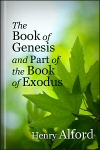
Prolific theologian and author Henry Alford passed away before finishing his commentary on the Book of Exodus, but The Book of Genesis and Part of the Book of Exodus is a thorough and excellent commentary on the first book of Moses, and the first twenty-five chapters of Exodus. A verse-by-verse examination of the Scripture, this volume by one of the 19th century’s best theologians is illuminating and comprehensive in its erudition of history, language, translation, and interpretation of Genesis and Exodus.
Henry Alford (1810–1871) was born in London and educated at Trinity College, Cambridge. A prolific preacher, artist, writer, biblical scholar, and lecturer, he authored numerous scholarly books as well as poetry and hymns. He was promoted to Dean of Canterbury in 1857. Alford’s principal work, The Greek Testament, was a twenty-year endeavor and a critical success when it was published, establishing his reputation as one of the most important and influential scholars of his time.
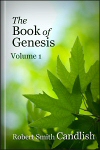
Originally titled Contributions to the Book of Genesis, Robert Smith Candlish’s Book of Genesis, Vol. 1 is an in-depth commentary full of interpretations and observations skillfully written and comprehensively researched. Volume 1 contains thirty-seven essays, beginning with four insightful essays on Creation.
Robert S. Candlish (1806–1873), a Scottish pastor, became a principal figure in establishing the Free Church of Scotland in 1843. A prolific author, prominent professor, and popular preacher, he was stationed as the distinguished principal of New College, Edinburgh in 1862.
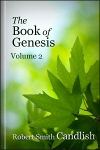
The second segment of Robert Smith Candlish’s masterwork, Book of Genesis, Vol. 2 continues with thirty-five more essays on the first book of Moses. Remarkably astute and wide-ranging in its breadth, this second volume is full of the same fiery passion that Candlish’s preaching was renowned for. Volume two of this extraordinary study of Genesis also includes a detailed appendix and supplemental additions to the first volume.
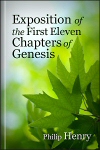
This commentary, written in the early 1600’s, was originally used by Rev. Philip Henry to teach his family about the Hebrew Bible. Published by one of his descendents in 1839, its wisdom still stands the test of time. With an astute introduction to each chapter, Henry’s analysis of the first eleven chapters of Genesis is inspirational and invigorating.
Philip Henry (1631–1696) was an English clergyman and graduate of Christ Church, Oxford. His writings and sermons were published posthumously to great acclaim.
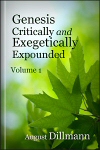
August Dillmann’s Genesis Critically and Exegetically Expounded established his reputation as a distinguished Old Testament scholar. Dillmann’s methodical approach to Genesis is outstanding in its textual precision, and includes Hebrew and Greek translations of key passages. Divided into five segments, volume one includes “The Primitive History from the Creation to the Flood” and “The History of Noah and his Descendants Down to Abraham.”
August Dillmann (1823–1894) graduated from the University of Tübingen and continued a life-long study of Ethiopic manuscripts. A professor of philosophy and a prolific writer, his books and lectures have been published extensively.
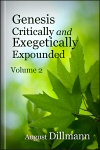
Volume Two of August Dillmann’s insightful Genesis Critically and Exegetically Expounded includes “The History of Abraham,” “The History of Isaac,” and “The History of Jacob.” An essential work for students and scholars of the Old Testament, Dillmann’s astute commentary has had an enduring impact on textual criticism and Biblical exegesis.
August Dillmann (1823–1894) graduated from the University of Tübingen and continued a life-long study of Ethiopic manuscripts. A professor of philosophy and a prolific writer, his books and lectures have been published extensively.
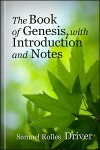
An expansion of the lectures he gave at the School of Theology at Oxford, Samuel Rolles Drivers’ The Book of Genesis, with Introduction and Notes is an engaging exploration of Genesis authored by one of the most noted scholars the Old Testament. Using archeological, historical, linguistic, and scientific data to help elucidate his reading of Genesis, Driver’s absorbing work is an important resource for the study of the first book of Moses.
Samuel Rolles Driver (1846–1947) was born in Southampton and educated at New College, Oxford, where he spent the rest of his distinguished career studying and teaching the Old Testament.
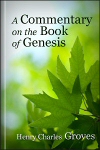
A staunch defense of the Mosaic authorship of the Pentateuch, Henry Charles Groves’ A Commentary on the Book of Genesis is a close examination of Genesis with the aim of refuting critics who believe it, along with the other four books of the Pentateuch, was redacted by others later in history.
. . . one of the best expositions of Genesis in our language, if not the very best.
—The Journal of Sacred Literature
Henry Charles Groves (1822–1903) is also the author of Infant Baptism and The Testimony of the Reformers to the Common Prayer.
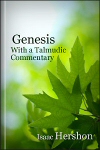
Paul Isaac Hershon’s The Pentateuch According to the Talmud is a fascinating analysis of the Talmud, and how expanded comprehension of its language and formation will lead to a deeper Old Testament exegesis. With Hershon’s extensive historical knowledge and profound understanding of the rabbinic writings in the Talmud, this exhilarating approach to Genesis is essential reading for biblical scholars and connoisseurs of history alike.
Paul Isaac Hershon (1817–1888) was born in Galicia and became a missionary at an early age. He retired from missionary work to devote himself to full-time study and translation of the Talmud, from which he published numerous books.
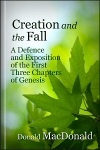
Feeling compelled to challenge the plethora of books and articles being published which discounted the genuineness of the Bible, Donald MacDonald felt the biggest attack on the Scripture was being aimed at the first three chapters of Genesis. MacDonald’s exhaustively researched book thoroughly covers the first three chapters of Genesis, delivering a strong refutation to those works that consider the Creation and the Fall “poetry, allegory, or mythology.”
Donald MacDonald was an author, theologian, and Minister of the Free Church of Scotland in Edinkillie.
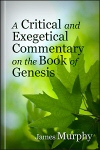
Troubled by John William Colenso’s book on the Pentateuch and his attack on the historicity of Genesis in particular, distinguished professor James Gracey Murphy presented A Critical and Exegetical Commentary on the Book of Genesis. as a response.
A work of massive scholarship, abounding in rich and noble thought, and remarkably fresh and suggestive.
— Evangelical Magazine
James Gracey Murphy was an author and a professor of Hebrew and Old Testament at Assembly’s College, Belfast.
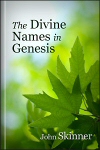
Originally a series of articles featured in the Expositor, John Skinner’s The Divine Names in Genesis is an examination of the names Elohim and Yahweh in the Old Testament, highlighting the differences of their use in the Masoretic Text and the Septuagint translations. Skinner’s thorough analysis is still widely cited as a strong argument for using the Hebrew text over the Greek as the basis for translations of the Old Testament for use in the Bible.
John Skinner (1851–1925) studied in Scotland and Germany at the end of the 19th century. He held pulpits in the Free Church of Scotland from 1880 until 1890, when he was elected to the faculty of what is now Westminster College, Cambridge. His illuminating book A Critical and Exegetical Commentary on Genesis is available for download from Logos Bible Software.
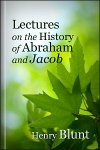
This spirited voyage into the histories of Abraham and Jacob, as chronicled in Genesis, was a critical success when it was published, generating many new editions and printings. Consisting of twelve lectures on Abraham, and eight lectures on Jacob, this in-depth examination into the lives and deeds of these two men is packed with meaningful and practical lessons expounded with Blunt’s charismatic verve. Lectures on the History of Abraham and Jacob is a focused, astute rendering of two of the Old Testament’s most studied men.
Rev. Henry Blunt (1794–1843) was a popular preacher at Trinity Church in Chelsea and a former fellow of Pembroke College, Cambridge. An accomplishment lecturer and professor, Blunt was also a prolific author whose work found large readership across Europe and the U.S.
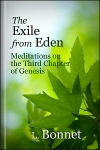
Louis Bonnet’s Exile from Eden is a salient exploration of the Fall, chronicled and elucidated in nine acute meditations:
- The Image of God
- The Temptation
- The Allurements of the Temptation
- Man a Sinner
- The Interrogatory
- The Curse
- The Punishment of Sin
- The Name of Eve
- The Banishment
These solid meditations are followed by “Exegetical Developments,” a chapter dedicated to “proofs and illustrations on the subject.”
Louis Bonnet was the son of a farmer and co-pastor of the Huguenot Church in London. His book Family of Bethany; Or, Meditations on the Eleventh Chapter of the Gospel According to St. John was also released to wide acclaim.
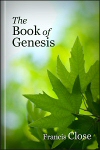
Consisting of twenty-nine sermons originally preached in the Church of Holy Trinity in Cheltenham, Close’s Book of Genesis proved to be so popular that it required a second reprinting almost immediately. Close starts with the insightful essay “The Importance of the Old Testament,” and closes this illuminating volume with a powerful sermon, “The Compassion of Joseph.”
Francis Close (1797–1882) received his MA from St. Johns College, Cambridge and became rector of Cheltenham in 1826, where he served for thirty years. He is the author of over seventy books and pamphlets. A marble statue erected in his honor can be found in the Carlisle Cathedral.
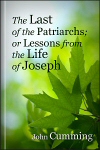
In fifteen riveting chapters, John Cummings unfolds “the very suggestive, beautiful, and popular incidents of the life of Joseph.” The last chapter, “Lesson for Young Men,” was popular enough to be published independently. Filled with keen insight and useful lessons, Cumming’s The Last of the Patriarchs is a focused study and essential resource on the life of Joseph.
John Cumming (1807–1881) was an influential and renowned preacher of the National Scottish Church in Covent Garden. He published approximately one hundred eighty books in his lifetime.
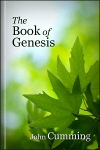
John Cummings turned a congregation of eighty into eight-hundred with his passionate preaching and his ability to articulate complex biblical passages into easy to understand terms. This solid, fifty-chapter anthology of Cumming’s sermons on the book of Genesis provides an in-depth look into the first book of Moses, colored with Cumming’s astute commentary and perceptive insight.
John Cumming (1807–1881) was an influential and renowned preacher of the National Scottish Church in Covent Garden. He published approximately one hundred eighty books in his lifetime.
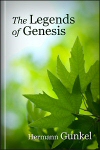
Herman Gunkel’s controversial book on Genesis, published in 1901, is still widely read and commented on today. Beginning with an elaborate introduction on the nature of legends and what constitutes a legend, Gunkel then sets forth to identify the stories in Genesis that fit those parameters. It is his belief that the origination of these stories cannot be traced back to written documents because they were passed on in an oral tradition from preliterate societies. A challenging and polarizing book, it nevertheless presents fresh insight into the book of Genesis.
Hermann Gunkel (1862–1932) was a Professor of Old Testament in Berlin. A prolific scholar and writer, his other major works include Creation and Chaos in the Primeval Era and the Eschaton, The History of Religion and the Old Testament, and An Introduction to the Psalms.
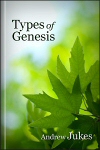
A proponent of typology, Andrew Jukes’ Types of Genesis endeavored to show that the qualities of major characters/events in Genesis are analogous of events in the New Testament. Jukes divided his examination and elucidation of Genesis into seven parts:
- Adam (Human Nature)
- Cain and Abel (Carnal and Spiritual Mind)
- Noah (Regeneration)
- Abraham (Spirit of Faith)
- Isaac (The Spirit of Sonship)
- Jacob (The Spirit of Service)
- Joseph (Suffering and Glory)
Andrew Jukes was a prolific author and clergyman educated at Trinity College, Cambridge. His other major works include The Law of the Offerings, The Restitution of All Things, Four Views of Christ, and The Differences of the Four Gospels.
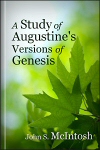
After reviewing various theories of the origin and nature of the Old Latin Bible in the Introduction, John S. McIntosh narrows his focus to St. Augustine’s quotations from the Book of Genesis, and endeavors to find out if Augustine referred to a single or multiple translations of the Latin Scriptures when writing his verses. Comparing style, form, syntax, as well as the omission/addition of words, McIntosh’s study of Genesis through the writing of St. Augustine is captivating.
John S. McIntosh received his PhD in Latin from the University of Chicago.
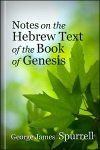
Aimed at students beginning the Hebrew language, Spurell’s informative book is an in-depth study of the English translation of Genesis, with a special focus on grammar. It also includes two noteworthy appendices: the first dealing with the structure of Genesis, and the other, a discussion of the various names of God used in different translations.
George James Spurrell, M. A., graduated from Balliol College, Oxford in 1880 and was named Hebrew Lecturer at Wadham College.
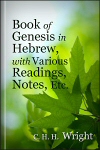
An astute overview of Genesis in the Hebrew translation with an emphasis on grammar, C. H. H. Wright’s practical Book of Genesis is packed with helpful references and notes to help beginning students and seasoned scholars of Hebrew get an enhanced understanding of Genesis in its original language. “A great benefit to Hebrew students by its publication.” –Literary Churchman
C. H. H. Wright (1836–1909) was born in Dublin an educated at Trinity College, Dublin. A prolific author and lecturer, Wright taught Hebrew in the Universities of Oxford, London, Manchester, and Wales.
Reviews
5 ratings

Peter O'Handley
10/5/2020

Wilson Baird
8/9/2016

Larry Proffitt (I
11/19/2013

Bill Shewmaker
10/8/2013
Eduardo Vega
9/25/2013